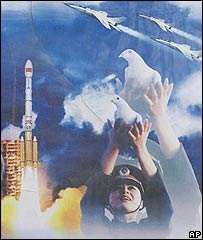George Bush In India- What is Success?

BBC News
February 28, 2006
By Paul Danahar
BBC South Asia bureau editor
Politicians, like journalists, need a good crisis. Margaret Thatcher famously said of the Falklands war that it was "exciting" after "dealing with hum drum issues like the environment."
And like journalists, politicians need headlines.
In Delhi at the moment neither are having much fun because we are facing the prospect of a visit from the first Republican President since Richard Nixon that nobody will much remember.
Unlike other world figures, George Bush will not be lunging into crowds of Rajasthani villagers or addressing the parliament of the world's largest democracy.
Lunches that matter
Nor will he assume a wistful gaze at the Taj Mahal or climb on the back of an elephant.
George Bush is flying half way around the world... to have lunch.
Several lunches actually, but none that seems to promise either headlines or provoke much of a crisis, unless he collapses between courses like his father did on a state visit to Japan many years ago.
When George Junior's visit was being touted last year there was something much more exciting on the table - an "historic" deal which would allow India to gain access to US civilian nuclear technology.
The deal was clearly supposed to be in the bag long ago. Instead the negotiators have been "working on it now" in the run up to the president's arrival.
Of course the off-the-record briefers - and there are a lot of them at the moment - are busy telling us journalists that even without the deal the visit is hugely important.
But when they start talking about those "important" issues, like the environment or agriculture or "deliverables", pens start slipping off notepads.
Failure?
How, one journalist asked at a briefing, was the trip going to be sold as a success to the world with no real deal, and no big memorable event?
"Well," said the high powered briefer, "that all depends on you people." He got a laugh out of us but we got little out of him.
So the question seems to be, if the nuclear deal is not fully ironed out now is the visit a failure?

For the journalists probably yes. But for the US and India, no.
The true significance of this visit is not what comes out of it. It's not even really the deal itself.
The real significance of the negotiations about sharing nuclear technology is the fact of the negotiations.
By having them and coming here, to Delhi, the United States government is saying to India "we trust you, you're one of us, we want you to join our club".
A senior American official told me recently that the US wants to be "helpful" to India as it "emerges as a world power".
What he wouldn't be drawn on was whether he meant a world military power or a world economic power.
But sift through this year's quadrennial US defence review and you get a steer. The document is produced by deep thinkers in the Pentagon gazing into their crystal balls.
Special relationship
At the heart of the latest review is a commitment to build strategic partnerships with other countries to counter possible risks to American interests around the world, 20-30 years from now.
At the same time it seeks to insure that no other country, or collection of countries, comes close to the US in terms of military or economic power.
In the 20th century, Europe was at the heart US foreign policy. It tried to manage Europe via its "special relationship" with the UK.
With talk of this being an Asian century it would seem sensible for the US to find a similar "special relationship" there.
For most of the post-cold war period the Asia Pacific region dominated the US Asian agenda. America was the region's biggest trading partner, economic growth was also fuelled by US involvement in wars in Korea and Vietnam.
Now many countries in the region are doing more business with China. With economic clout comes political influence. The US is watching heads slowly turn away to the new economic giant.

So the candidate for another "special relationship" needs to shares all of the US's concerns about China but without the potential to become a threat itself.
And if that country also offers a chance to replace the trading opportunities siphoned off by Beijing, then even better.
India with it's hostile neighbours, global ambitions and huge aspirant middle-class would seem a perfect choice.
This trip might not produce headlines, but it may be signalling a seismic shift in relations, one that will still have an impact on the world long after this visit is forgotten.
Story from BBC NEWS:
http://news.bbc.co.uk/go/pr/fr/-/2/hi/south_asia/4759592.stm
Published: 2006/02/28 17:33:29 GMT
© BBC MMVI

1 Comments:
Hello !.
You may , probably curious to know how one can collect a huge starting capital .
There is no need to invest much at first. You may start earning with as small sum of money as 20-100 dollars.
AimTrust is what you haven`t ever dreamt of such a chance to become rich
The company incorporates an offshore structure with advanced asset management technologies in production and delivery of pipes for oil and gas.
Its head office is in Panama with offices everywhere: In USA, Canada, Cyprus.
Do you want to become an affluent person?
That`s your chance That`s what you really need!
I feel good, I started to take up real money with the help of this company,
and I invite you to do the same. It`s all about how to choose a proper partner utilizes your funds in a right way - that`s it!.
I make 2G daily, and my first investment was 500 dollars only!
It`s easy to get involved , just click this link http://nebywyjuxy.maddsites.com/wyfahok.html
and go! Let`s take this option together to feel the smell of real money
Post a Comment
<< Home